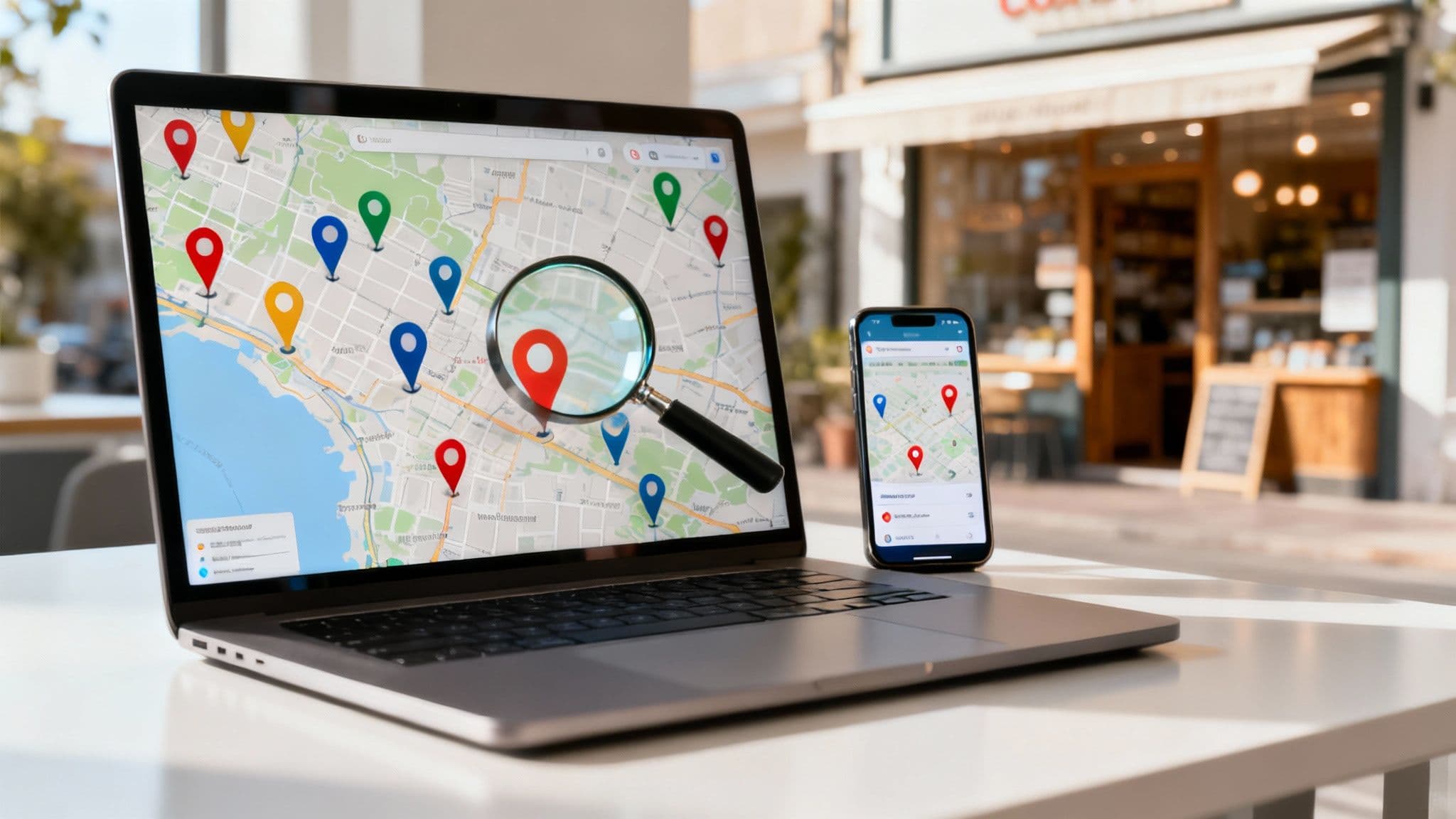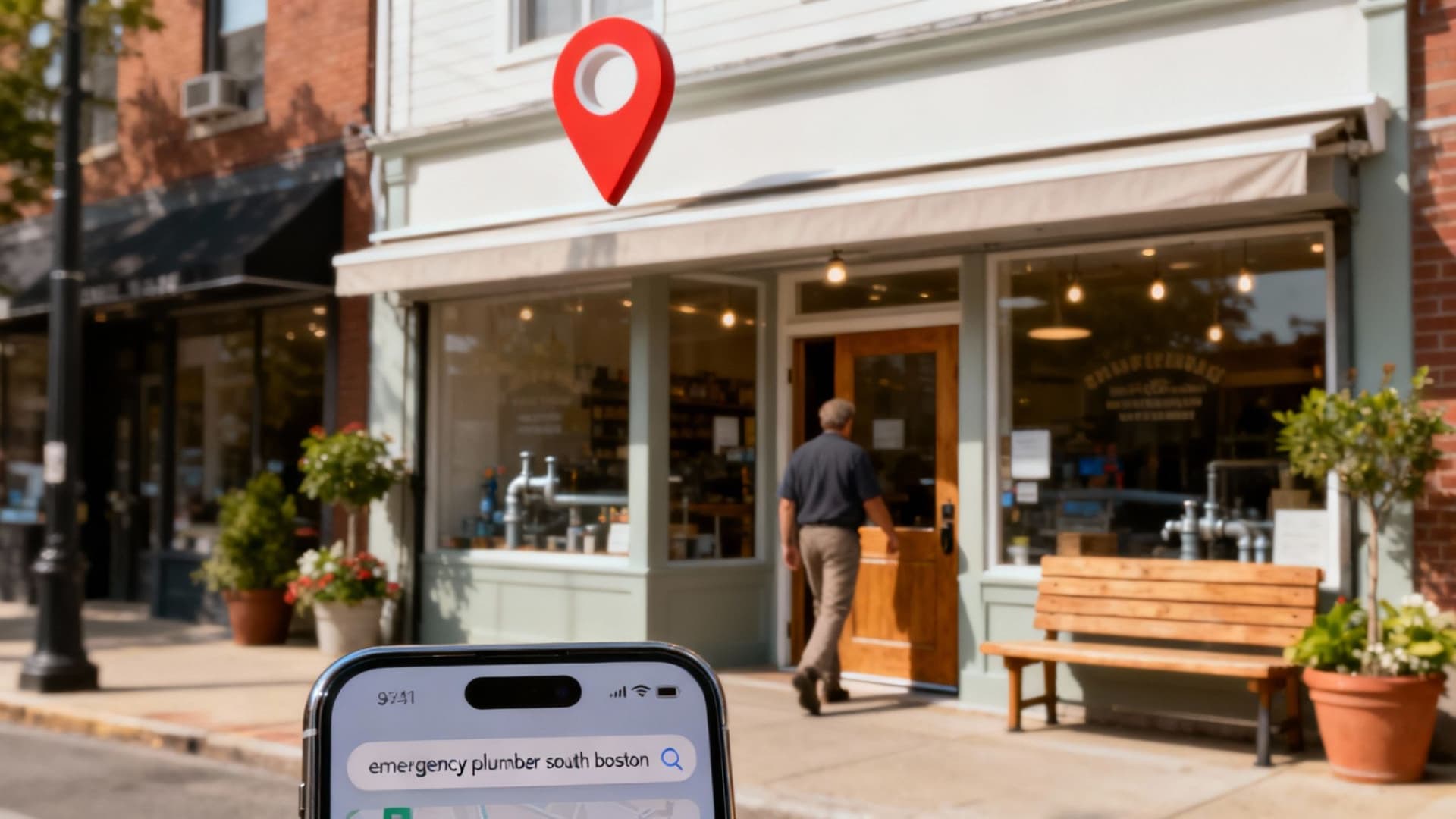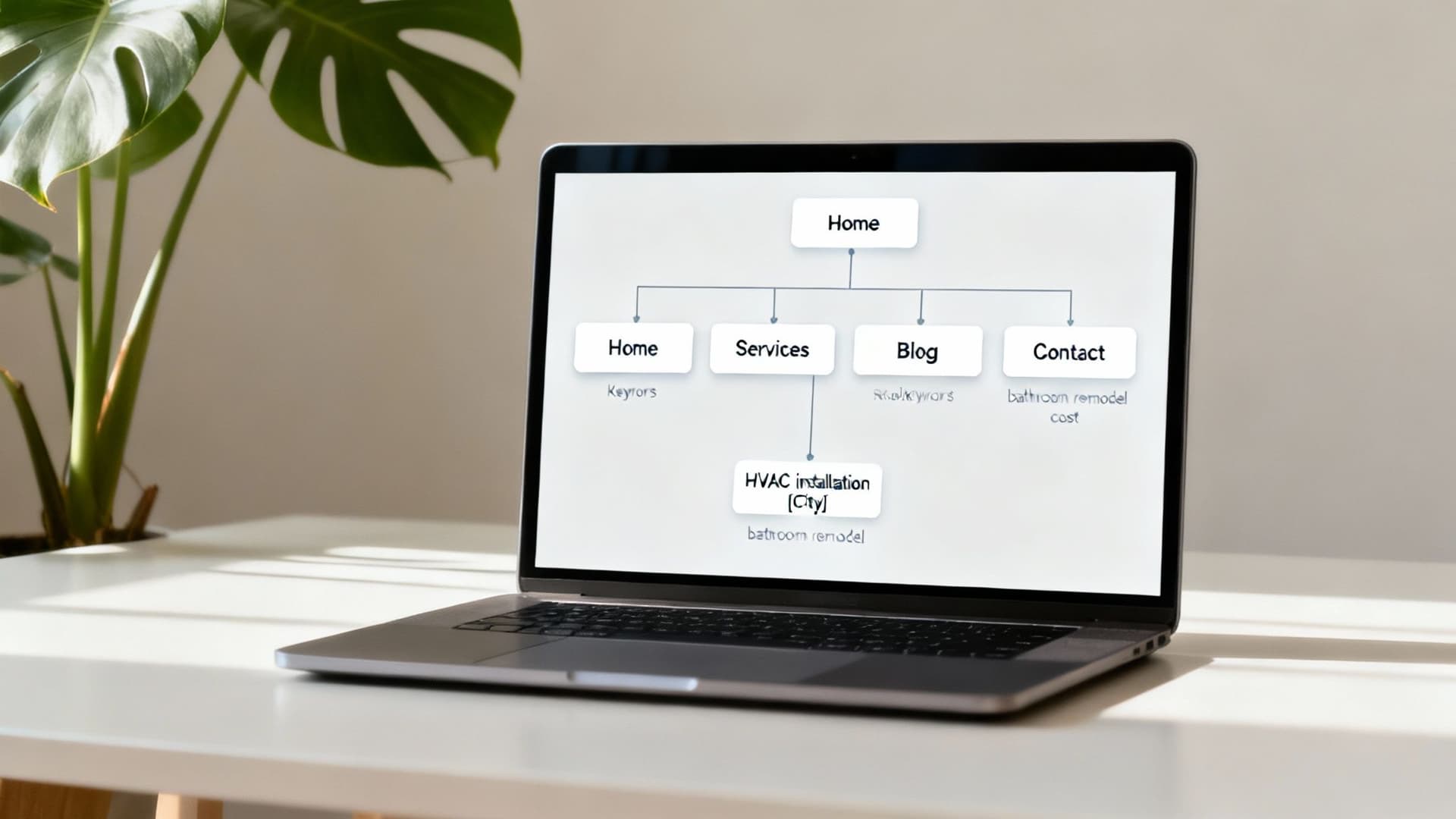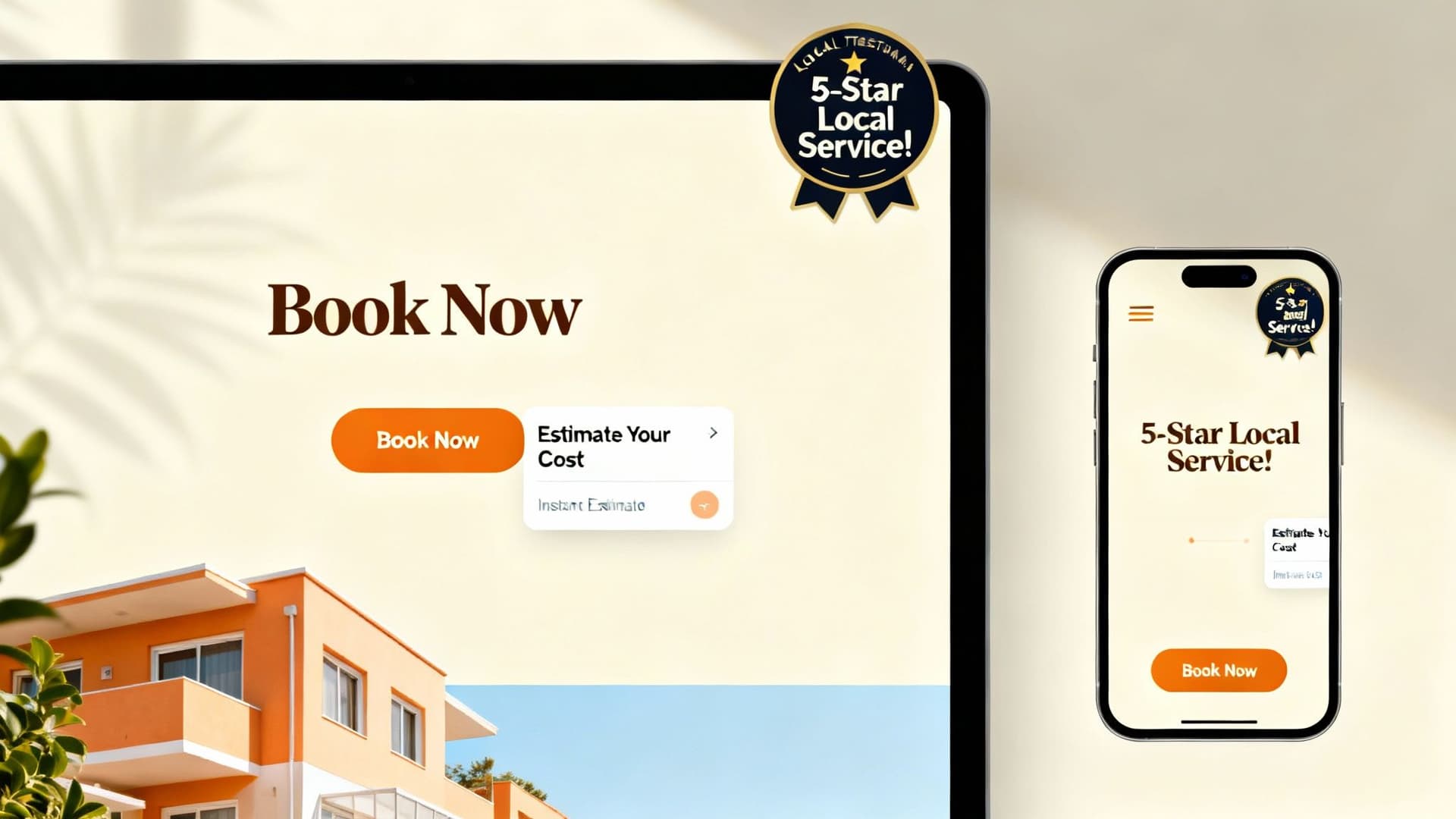Master local keyword research with this guide. Learn proven strategies to find the keywords your local customers use and turn search traffic into sales.
November 25, 2025 (Today)
A Guide to Local Keyword Research
Master local keyword research with this guide. Learn proven strategies to find the keywords your local customers use and turn search traffic into sales.
← Back to blog
A Guide to Local Keyword Research
Summary: Master local keyword research with this guide. Learn proven strategies to find the keywords your local customers use and turn search traffic into sales.
Introduction
If you run a local business, your keyword strategy needs a different playbook. Local keyword research digs into the exact phrases and questions people in your service area type into search engines. Think “dentist in Brooklyn” or “Mexican restaurant near me,” not broad national terms. This guide shows practical steps to find those phrases, prioritize them, and turn local searchers into paying customers.
Why Local Keywords Are Your Secret Weapon

Trying to rank for a generic term like “plumber” is often a losing battle. You’re competing with national brands and large informational sites. But target a phrase like “emergency plumber in South Boston” and the competition narrows to the handful of plumbers who actually serve that neighborhood. That’s how you turn a website from a passive brochure into an active lead-generation machine.
The High Intent of Local Searches
Someone searching for a local service usually needs a solution now. A search for “best coffee” might lead to a general article, but “best coffee near me” usually means the searcher wants a latte immediately. Local searches tend to have strong purchase intent, which is why they’re so valuable to small businesses. Roughly 46% of searches show local intent1, and many local mobile searches lead to same-day visits and purchases—showing the direct revenue potential of local SEO23.
Local keyword research isn’t just about more traffic. It’s about the right traffic—people in your service area who are ready to buy.
From Keywords to Customers
Local keywords are the foundation of your online presence. They belong on service pages, your Google Business Profile, and in the site structure itself. A site organized around local terms makes it easy for users and search engines to understand what you do and where you do it.
For example, a home contractor can target many hyperlocal phrases instead of only chasing “home remodeling.” Consider pages for:
- “kitchen renovation cost in [Your Town]”
- “basement finishing companies near [Your Neighborhood]”
- “local deck builder reviews [Your City]”
Each phrase reaches a customer at a specific stage of the buying journey, helping position your business as the most relevant local solution.
How to Find the Keywords Your Customers Actually Use
Start with “seed” keywords—the obvious terms that describe your business. A roofer in Denver might begin with “roof repair Denver,” “new roof installation,” or “shingle replacement.” From there, expand into long-tail and question-based phrases.
Start with What You Already Know
Your business itself is a goldmine. Listen to customer calls and note common questions—each one can become a long-tail keyword. Use your Google Business Profile insights to see the actual queries people used to find your listing; that’s real evidence of what’s driving local customers to you.
Let Google Do the Heavy Lifting for You
Use Google Autocomplete and the “People Also Ask” and “Related searches” sections to discover long-tail variations. If you type “roof repair Denver,” autocomplete suggestions like “cost,” “emergency,” or “metal roofing” reveal what people really need.
See What Your Competitors Are Up To
Look at local competitors that rank well in your area. Check their page titles, H1s, and service pages to see which local phrases they target. You’re not copying them—you’re identifying gaps. If everyone targets city-level terms, there may be an opportunity to dominate neighborhood-level searches.
Analyze your top three local competitors to build a baseline keyword strategy tailored to your market.
Practical Tools and Calculator Examples
Brainstorming becomes scalable when you pair it with tools. For many service businesses, embedding an interactive estimator answers the searcher’s primary question—cost—right on the page.
Examples of useful calculators you can link to or model from include:
- Basement Finishing Cost Estimator
- Kitchen Remodel Cost Estimator
- Roof Replacement Cost Estimator
- House Cleaning Rates Estimator
A lawn care business could build a simple cost tool to capture keywords like “cost to mow lawn” or “seasonal cleanup pricing.” A mover could use the Moving Company Cost Estimator as inspiration for landing pages that answer pricing questions and capture leads.
How to Analyze and Prioritize Your Keyword List
You’ll end up with a long list of potential keywords. Turn that pile of data into an actionable plan by focusing on three elements: local search volume, keyword difficulty, and user intent. Ask how many people in your area search for a term, how hard it will be to rank, and what the searcher really wants.
Gauging Search Volume and Difficulty
Local search volume estimates how many people in your service area search a keyword each month. Keyword difficulty (KD) estimates how hard it will be to reach the first page of results. Target realistic, lower-difficulty keywords you can own rather than fighting for huge, high-competition terms.
Tools like Google Keyword Planner can help you find long-tail keywords that bring targeted local traffic.
Decoding User Intent
User intent is the most important factor. For local businesses, intent generally falls into three buckets:
- Informational: Research queries like “how to fix a leaky faucet.” Best suited to blog posts.
- Commercial/Transactional: Ready-to-buy queries like “24-hour plumber South Boston.” Best suited to service pages.
- Navigational: People searching for your business name or hours.
Map each keyword to the right page type so visitors find the answer they expect.
This simple decision flow—brainstorm, expand with Google and competitors, then prioritize by data—guides you from idea to execution.

Creating a Prioritization Framework
Use a simple spreadsheet to rank keywords by estimated local volume, competition, and business relevance. Focus first on transactional keywords with clear buying intent and manageable competition. Informational keywords still matter for building authority, but transactional terms will usually drive direct leads.
Mapping Keywords to Your Website and Content

Match keyword intent to page type. Treat your site like a store: service pages are the aisles where people buy, and the blog is the information desk. Each page should target one primary keyword to avoid keyword cannibalization.
Assigning Keywords to the Right Pages
- Transactional keywords → Service pages with strong CTAs, testimonials, and local details.
- Informational keywords → Blog posts, guides, and how-tos that build trust and authority.
Every page should answer the user’s immediate question and guide them toward the next step.
Creating Helpful Local Content
Write about local projects, answer hyper-local questions, and build community guides that naturally include local keywords. Examples:
- Before-and-after posts from a recent project in a well-known neighborhood.
- Area-specific advice such as “Choosing the Best Roofing for Denver Hail Storms.”
- Neighborhood guides that cover schools, parks, and local amenities.
Monetizing Local Content
Local guides can generate steady traffic that you can monetize. For example, once a guide attracts consistent views, you could add carefully chosen local ads or partner links. Use tools like the Home Renovation Budget Estimator to create interactive pages that answer cost questions and capture leads.
For multi-location businesses, ensure each storefront has unique, location-specific pages and content so search engines and customers can associate content with the right area.
Turning Local Search Traffic into Customers

Ranking for local keywords is important, but converting traffic is where revenue comes from. Local visitors are often ready to act—your pages must make choosing you the obvious next step.
Crafting Pages That Convert
Every local landing page should include:
- A clear headline that mirrors the user’s search
- An obvious call-to-action like “Get a Free Quote” or “Schedule Service Now”
- Local trust signals: testimonials, local awards, or membership logos
These elements reduce friction and turn motivated visitors into leads.
The Power of Instant Value
Answering the number-one question—cost—on the page itself is powerful. Embedding an interactive estimator turns casual visitors into qualified leads. Offering instant value first builds trust and increases conversions.
For example, a contractor targeting “bathroom remodel cost [City]” can embed a calculator that gives a quick estimate and captures contact details. Tools like the Square Footage Cost Estimator or Kitchen Remodel Cost Estimator are great models for this approach.
Tapping High-Intent Mobile Searches
Mobile local searches have a very high conversion rate—many searches lead to offline purchases and same-day visits. Mobile users often want immediate answers, so make sure your site is fast, mobile-friendly, and includes phone click-to-call buttons and instant tools.
Local SEO: Your Questions Answered
Practical, on-the-ground tactics separate businesses that show up in the Google Map Pack from those stuck on page five. Optimizing your Google Business Profile and keeping consistent NAP (Name, Address, Phone) listings across the web are foundational.
How Often Should I Revisit My Keyword Strategy?
Keyword research isn’t “set it and forget it.” Do a major review once a year and smaller check-ins quarterly. Local trends change—storms, new competitors, and seasonal demand can create timely opportunities.
Can I Rank in a City Where I Don’t Have an Office?
Yes, especially for service-area businesses. Use dedicated location pages with unique, local content: case studies, testimonials from that area, and discussion of local conditions or codes. Don’t just copy and swap city names—provide real value specific to each location.
How Important Is “Near Me” for Local SEO?
Very important. “Near me” searches signal immediate intent. Rather than stuffing “near me” across your site, focus on a well-optimized Google Business Profile, consistent NAP information, and locally relevant site content. That combination signals to search engines you’re the closest, best answer for nearby searchers.
Ready to turn local traffic into paying customers? Build interactive estimates and embed them on your site to capture high-intent leads. Try a tool like the Home Renovation Budget Estimator or the Roof Replacement Cost Estimator to see how instant answers boost conversions.
Common Questions (Q&A)
Q: What’s the fastest way to find local keywords that convert?
A: Start with your seed keywords, check Google Autocomplete and “People Also Ask,” review your Google Business Profile insights, and analyze top local competitors. Prioritize transactional, low-competition keywords with clear buying intent.
Q: Should I create separate pages for each neighborhood?
A: Yes—if you can provide unique, valuable content for each location (case studies, local testimonials, or area-specific advice). Don’t simply duplicate pages with different city names.
Q: What’s the best on-page element to improve conversions for local searches?
A: Answer cost questions and provide immediate value—an interactive estimator or clear pricing guide plus a strong CTA will dramatically improve conversions.
Ready to Build Your Own Tools for Free?
Join hundreds of businesses already using custom estimation tools to increase profits and win more clients